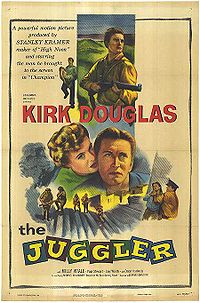
THE JUGGLER
US, 1953, 84 minutes, Black and white.
Kirk Douglas, Milly Vitale, Paul Stewart, Joseph Walsh, Alf Kjellin.
Directed by Edward Dmytryk.
The Juggler was a small film of 1953, made within the decade after World War Two and the liberation of survivors of the Holocaust. 1953 was also only five years after the establishment of the state of Israel. This film, therefore, is of historical interest as being made in the immediate aftermath of these significant events for Jewish people around the world. It is interesting to look back after more than half a century their the way that these stories were presented on screen, especially for an American audience.
Kirk Douglas had emerged as one of Hollywood’s leading stars in such films as Champion, The Bad and the Beautiful. He was to be a lifelong strong figure in Hollywood for more than sixty years. Here he portrays a man deeply disturbed by his experiences in Europe during the war. When he moves to Israel in 1949, he continues to have a tormented existence, assaulting a policeman, going on the run in the company of a young boy. The boy is portrayed by Joseph Walsh.
The leading lady is Milly Vitale, an Italian actress who had a twenty-five year career in Italy but appeared in very few American films. She appeared with Bob Hope in The Seven Little Foys and had a role in War and Peace and A Breath of Scandal.
The film was directed by Edward Dmytryk, one of the Hollywood Ten, who was blacklisted. He had to move to Europe during the late 40s and early 50s after having a successful career in Hollywood with such films as Murder My Sweet and Tender Comrade. On his return he made films like The Juggler and then moved into The Caine Mutiny and made a number of action adventures in Cinemascope into the 1960s. He made quite a number of big soap opera films of the 1960s including The Carpetbaggers.
The themes of The Juggler are universal, show insight into human nature, but are specifically of interest for the Jewish perspective.
1. The impact of the film on its first release in the fifties, now? Response to Israel then and now?
2. The quality of the film made on a small budget, Kirk Douglas, in this kind of role?
3. Black and white photography, Israeli locations and authenticity, Jewish atmosphere, the medley of Jewish folk music worked into the score?
4. The theme of the juggler and its visualizing in the credits, the importance of this as Hans' job, his sense of identity as a juggler, giving, him a past, being a celebrity with his clippings and memories? The act as it was presented later in the film, his abilities? The joy of juggling? His teaching Josh and the culmination in the concert? The juggler as a theme?
5. The presentation of Israel in 1949, the background of World War Two, the concentration camps and the persecution of the Jews, the sense of freedom, the refugees after the Israeli war? The ships, being herded on arrival, going Into camps? The question of control and fear of control?
6. The Israeli hopes, the vision of a rebuilt Israel, atmosphere of solidarity, friendship, life at a kibbutz? The contrast with the Syrian border, skirmishes and patrols, fear?
7. The quality of Kirk Douglas' portrayal of Hans, genial, friendly on arrival, Susie, giving her the photo? The dramatic change and his abruptness with his friends? His Imagining the woman and the children at the window as his wife? The unbalance and neurosis? His fear of the camp? The significance of his Interview on arrival and his explanation of himself, his past, his ability to juggle but no other jobs? The confrontation with the doctor and his dislike of being
patronized?
8. The background of prison, the continual need to break out, his recounting to Jael where he was imprisoned and the news of his family's death? His breaking out of the camp, the confrontation with the soldier and seeing him as a Nazi and bashing him? Oppression leading to violence?
9. The importance of the journey structures audience involvement, flight from the police, the importance of the witness, the children, Josh and happiness with him, the news vendor, the people at the kibbutz after the incident in the minefield, the relationship with Jael? The gallery of characters in themselves, their impact on Hans? The possibilities of hope through the contacts with people like this?
10. The portrayal of the police as doing their job but sympathetic? The encounter with the witness, tracing the evidence of the photo, the demand on Susie to give up the photo and betray Hans? The interview with the injured policeman, the children, the news vendor?
11. The humour and the significance of Hans pretending to be American? The dreams of the American way of life? The humour of people expecting Americans to be wealthy? The Importance of the tension, being discovered, the newspapers and the photo, the presence of the police? The drama of the minefield and the injury of Josh? People rescuing him? His lies to Jael to save himself, the confrontation finally of the truth with her?
12. His decisions not to run and their importance, to participate in the concert? The humorous atmosphere contrasting with the arrival of the police, his flight? Jael’s point that he was making a prison for himself and that he should come out to be free?
13. The hopes for the future, the optimism of the film? Its regard for human nature and its resilience? Hans as a symbol of the persecuted Jew coming into a new world, purging himself of fear, taking courage and emerging into a hopeful future?